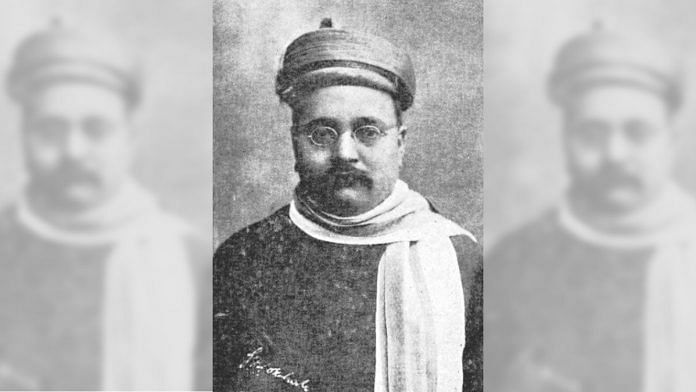Few historical figures, if any, in the 20th century stood up to the stature of M.K. Gandhi and Muhammad Ali Jinnah. But for both giants of India and Pakistan’s legacy owe their political journey to one man—Gopal Krishna Gokhale. In his book, Gokhale: My Political Guru, Gandhi proclaimed his interactions with the former Indian National Congress president as ‘embracing the Ganges,’ while Jinnah, in his reverence, wanted only to emulate him and become a ‘Muslim Gokhale.’
In Builders of Modern India: Gopal Krishna Gokhale, His Life and Speeches, author John S Hoyland wrote: “(In) the endeavour to train himself in the art of public speaking in English, he learnt, by heart, Paradise Lost and large portions of the speeches of Burke and John Bright. The many hours which he spent in this toilsome exercise bore fruit later in the marvellous command which he possessed over the English language as a medium for clear and incisive reasoning.”
Gokhale’s perseverance with English did pay off. He was renowned for the oratory skills that would astonish the politicians surrounding him and set the standard for those who came after. “He is not an orator in the ordinary sense of the word. He does not seek to rouse the feelings of his audience. His only aim is to convince his hearers of what he has to say. His delivery is fast. His ammunition is his wealth of facts and figures; his arguments persuasive and full of enthusiasm, and his style simple but chaste and firm,” Gandhi wrote in his book.
But Gokhale was more than just an orator. He was a social reformer too and fought passionately for the cause of women’s rights, primary education and caste discrimination. Author Bal Ram Nanda, in his book Gokhale: The Indian Moderates and the British Raj, wrote, “Gokhale started life as a teacher and taught at the New English School and the Fergusson College for nearly eight years. There was scarcely an aspect of the Indian educational system to which he had not given thought. He had pleaded for the extension of female, technical, and higher education. Above all, he had advocated the diffusion of elementary education among the Indian masses.”
Also Read: Tagore had the answer to rural poverty, education. The blueprint’s still in Santiniketan
Congress and Servants of India Society
Gokhale joined the Indian National Congress in 1899 and was elected as its president in 1905. Gokhale represented a moderate faction of the Congress, who advocated for more autonomy within British rule. However, he was popular across factions of the party. Even the radical Bal Gangadhar Tilak who advocated ‘purna swaraj’ or complete self-rule and was considered his ‘political opponent, at Gokhale’s funeral in 1915, said, “This diamond of India, this jewel of Maharashtra, this prince of workers is taking eternal rest on the funeral ground. Look at him and try to emulate him.”
Besides being one of the tallest leaders of the Congress, Gokhale also started the Servants of India Society in 1905. The Society sought to unite and train people of different religions and ethnicities to train them in welfare work in service of the nation. Gokhale advocated the virtues of fearlessness, courage, firmness and truth among members of the society.
“Love of the country,” he wrote in the preamble to the Society’s constitution, “must so fill the heart, that all else shall appear as of little moment by its side. A fervent patriotism which rejoices at every opportunity of sacrifice for the Motherland, a dauntless heart which refuses to be turned back from its object by difficulty or danger, a deep faith in the purpose of Providence which nothing can shake – equipped with these, the worker must start on his mission and reverently seek the joy which comes of spending oneself in the service of the Motherland.”
Also Read: Madhusudan Das — the lawyer who unified Odisha and reformed Indian judiciary
Influence on Gandhi and Jinnah
When Gandhi returned to India as a young barrister, he received personal guidance from Gokhale, teaching him about India and the issues confronting common citizens. He also credited Gokhale for the Education Bill and for abolishing slavery of indentured labourers in India. In his book, Gandhi further said that Gokhale treated him like a younger brother. And described meeting Gokhale as though he was embracing the Ganges.
“Gokhale was as the Ganges. One could have a refreshing bath in the holy river. The Plimalaya was unscaleable, and one could not easily launch forth on the sea, but the Ganges invited one to its bosom. It was a joy to be on it with a boat and an oar. Gokhale closely examined me, as a schoolmaster would examine a candidate seeking admission to a school”, he wrote.
Jinnah, too, was inspired by Gokhale’s patriotic spirit and unfaltering determination to serve his nation, He admired, above all, his fearless critique of the British government’s measures and administration without giving away reason and moderation.
“One of the greatest lessons that his life and work teach me is the example of what one single individual can achieve, how powerfully and materially he can help and guide the destinies of his country and his people and from whom how millions can derive true lead and inspiration,” Jinnah wrote.
Though, ultimately, on opposite ends of the spectrum, Gandhi said Gokhale was the most perfect man in the political field. And rightly so.
On his deathbed, he is said to have told his colleagues at the Servants of India Society, “Don’t waste your time in writing a biography or setting up a statue but pour your whole soul into the service of India. Then only shall you be counted among her true and faithful servants.”
(Editedd by Srinjoy Dey)



